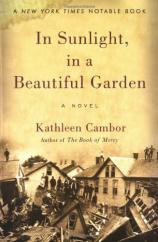Reading Group Guide
Discussion Questions
In Sunlight, in a Beautiful Garden: A Novel

1. "To understand the geography was to understand the place." Kathleen Cambor imbues her novel with a rich sense of both physical and emotional geography. Most of the novel takes place in three locations: Johnstown, South Fork, and Pittsburgh. How does the author characterize these settings? What relevance does place have to the important events of the novel?
2. In the aftermath of the Civil War, Julia thinks to herself, "How could any of it be spoken of, ever?" [37]. How does the war, though seldom spoken of, continue to affect the lives of the characters both in Johnstown and at the club?
3. "Evelyn, at the clubhouse window, watched Nora move forward into the crowded press of the young, the entitled. She watched her daughter gain what she had always wanted and never had. A place on the boat" [133]. Describe the social order in which the characters in the novel live. What factors determine who is accorded "a place on the boat"?
4. "As sweet as the wild strawberries tasted, as crystalline the lake, sometimes an acrid, bitter stench invaded paradise, crept up the mountains, fingered its way through the shielding trees" [20]. What is the smell that Nora notices? What is the relationship between the South Fork Fishing and Hunting Club and the town of Johnstown?
5. The author gives us insight into a particular moment in American history. Why do you think she chose to approach this history through fiction?
6. As they are trying to salvage their belongings from the flood, Frank and Julia realize they will not be able to rescue their most prized possession, the piano that Frank bought for Julia early in their marriage. Julia does manage, however, to keep the sock in which Frank had saved the money for the piano. Pointing to the piano, she says, "We're strong, but we can't take that...Besides, I've got the sock, Frank. That matters more. It was all that saving, all that love that mattered" [240]. What does Julia's statement suggest about the nature of love and loss?
7. "Perhaps Nora had been right about the dam when she was young, right to imagine that it could breathe, that it was in its own way a living thing" [79]. The dam occupies a central position in the novel. Is it possible to see the dam as a character in the story? What human-like qualities do other characters ascribe to the dam?
8. Why does Daniel hit Nora on the night of the flood? Is his anger at her justified?
9. The collapse of the dam, the author suggests, was largely a result of unrestrained self-interest. What is the author's critique of late 19th century American society? Is this critique applicable to today's society?
10. James Talbot has lost much of his family to the war, Grace has lost a marriage, Frank and Julia have lost two children. How do these characters deal with their losses? Are some attempts to recover from loss more successful than others?
11. In signing the charter for the South Fork Fishing and Hunting Club, James Talbot compromises his own ethical standards. What do he and his family gain, and lose, from this compromise?
12. "[Frick] had always thought himself closed to sentiment, so it surprised him when he discovered, while still a boy, that he loved the painted image, that the mixture of texture, color, light, was so appealing to him" [88]. Why are art and beauty so valued by Frick, Mellon, and Carnegie? What is the relationship of beauty to money in the novel?
13. This novel could on one level be said to be about cowardice and courage. Which acts of cowardice shape the events of the novel? Which acts of courage? Can any of the characters in the book be considered heroes?
14. What are the forces or events which pull Nora and Daniel apart? Is their estrangement from each other by the end of the novel inevitable?
15. Many of the characters in the novel have secrets. James hides his family history, Grace hides her marriage, Nora and Daniel hide their relationship. What is the significance of secrecy to the novel, and what, if any, relationship does it have to the final disaster?
16. How does the author portray Mellon, Carnegie, and Frick? Do you feel sympathy for them?
17. "Hers was a world quite different from his," thinks Daniel about Nora, "Nonetheless, he had come to imagine that they were alike somehow. That they shared something essential, that they'd met in another life, that their souls were bound" [165]. What is the "something essential" that Daniel and Nora share?
18. "There would be no betrayal of Julia, they each said to themselves without the knowledge of the other, unaware that subtly, insidiously, without their assent or awareness, the notion of betrayal had entered into their thinking, crossed their minds" [234]. Do you think Frank and Grace betray Julia? What role does Grace ultimately play in Frank and Julia's marriage?
19. Who, if anyone, do you hold primarily responsible for the Johnstown disaster? Does the author seem to have an opinion about this?
In Sunlight, in a Beautiful Garden: A Novel
- Publication Date: March 5, 2002
- Paperback: 272 pages
- Publisher: Harper Perennial
- ISBN-10: 0060007575
- ISBN-13: 9780060007577






